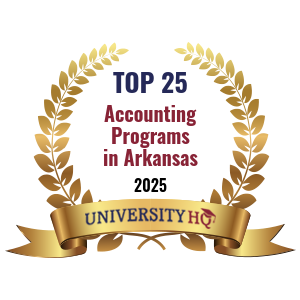What is Accounting?
Accounting is one of the world's oldest professions. In fact, many believe that humanities oldest written documents were ledgers that tracked transactions. The basis of the modern Arkansas economy is a record of transactions which accountants are especially skilled at assessing. This page is all about how Arkansas students or professionals can become accountants and the programs available within the state’s colleges and universities.
For those who wish to earn degrees in accountancy, it's valuable to have a clear view of the state economy. After all, every industry requires its own approach to accounting, especially regarding taxation. Since agriculture is one of the top industries in Arkansas, colleges and universities offer students exposure to the special issues related to that issue. For instance, farmers often have special tax exemptions, inventory issues, and government subsidies that must be accounted for in special ways.
Arkansas is also strong in the transportation and logistics industry. This may not come as a surprise, given the state's central location in the country. Accountants in that industry may need to audit shipping lines for fuel usage, the time required to ship along certain routes, or other logistical features. An accountant's assessment of the costs and benefits of various shipping routes, methods, etc. can potentially make or break a firm's quarterly fiscal health.
Arkansas students of accountancy might also study healthcare and the special issues related to that industry. Though this industry is not often considered one of the state's top economic concerns, it is one of the largest and fastest growing industries in the nation. Since many health systems are operated as non-profit organizations, it may behoove students to focus on that form of accounting. Given that there are tuition forgiveness programs available for students who go to work for government or non-profit agencies, this could be a lucrative career choice.

Featured Online Programs
Best Schools for Accounting in Arkansas
University of Arkansas
Score: 81.05
- Undergraduate Tuition
- In-State: $9,748
- Out-of-State:$28,772
- Net Price: $17,475
- Acceptance Rate: 72%
- Retention Rate: 86%
- Graduation Rate: 70%
- Total Enrollment: 32,140
- Undergrad Students: 27,472
- Graduate Students: 4,668
- Grads Salary: $72,000
- Student-to-faculty: 20:1
Hendrix College
Score: 78.54
- Undergraduate Tuition
- In-State: $36,650
- Out-of-State:$36,650
- Net Price: $24,236
- Acceptance Rate: 53%
- Retention Rate: 78%
- Graduation Rate: 69%
- Total Enrollment: 1,107
- Undergrad Students: 1,098
- Graduate Students: 9
- Grads Salary: $74,000
- Student-to-faculty: 11:1
Arkansas State University
Score: 76.14
- Undergraduate Tuition
- In-State: $7,754
- Out-of-State:$13,826
- Net Price: $13,002
- Acceptance Rate: 70%
- Retention Rate: 78%
- Graduation Rate: 55%
- Total Enrollment: 14,032
- Undergrad Students: 8,760
- Graduate Students: 5,272
- Grads Salary: $65,000
- Student-to-faculty: 15:1
University of Arkansas at Little Rock
Score: 76.1
- Undergraduate Tuition
- In-State: $8,455
- Out-of-State:$19,210
- Net Price: $11,225
- Acceptance Rate: 58%
- Retention Rate: 71%
- Graduation Rate: 41%
- Total Enrollment: 8,158
- Undergrad Students: 5,789
- Graduate Students: 2,369
- Grads Salary: $70,000
- Student-to-faculty: 11:1
Harding University
Score: 75.21
- Undergraduate Tuition
- In-State: $24,888
- Out-of-State:$24,888
- Net Price: $21,069
- Acceptance Rate: 100%
- Retention Rate: 87%
- Graduation Rate: 71%
- Total Enrollment: 4,608
- Undergrad Students: 3,496
- Graduate Students: 1,112
- Grads Salary: $69,000
- Student-to-faculty: 16:1
John Brown University
Score: 74.15
- Undergraduate Tuition
- In-State: $30,832
- Out-of-State:$30,832
- Net Price: $21,464
- Acceptance Rate: 68%
- Retention Rate: 84%
- Graduation Rate: 67%
- Total Enrollment: 2,341
- Undergrad Students: 1,882
- Graduate Students: 459
- Grads Salary: $65,000
- Student-to-faculty: 16:1
Southern Arkansas University
Score: 73.53
- Undergraduate Tuition
- In-State: $9,820
- Out-of-State:$15,400
- Net Price: $14,164
- Acceptance Rate: 67%
- Retention Rate: 69%
- Graduation Rate: 46%
- Total Enrollment: 5,127
- Undergrad Students: 3,224
- Graduate Students: 1,903
- Grads Salary: $70,000
- Student-to-faculty: 16:1
University of the Ozarks
Score: 71.52
- Undergraduate Tuition
- In-State: $25,950
- Out-of-State:$25,950
- Net Price: $16,651
- Acceptance Rate: 58%
- Retention Rate: 73%
- Graduation Rate: 52%
- Total Enrollment: 763
- Undergrad Students: 763
- Graduate Students: N/A
- Grads Salary: $62,000
- Student-to-faculty: 13:1
University of Arkansas at Pine Bluff
Score: 71.44
- Undergraduate Tuition
- In-State: $9,019
- Out-of-State:$17,029
- Net Price: $11,649
- Acceptance Rate: 58%
- Retention Rate: 65%
- Graduation Rate: 40%
- Total Enrollment: 2,100
- Undergrad Students: 1,905
- Graduate Students: 195
- Grads Salary: $64,000
- Student-to-faculty: 13:1
Lyon College
Score: 71.11
- Undergraduate Tuition
- In-State: $31,000
- Out-of-State:$31,000
- Net Price: $22,675
- Acceptance Rate: 66%
- Retention Rate: 68%
- Graduation Rate: 56%
- Total Enrollment: 584
- Undergrad Students: 584
- Graduate Students: N/A
- Grads Salary: $70,000
- Student-to-faculty: 10:1
Arkansas Tech University
Score: 71.09
- Undergraduate Tuition
- In-State: $8,508
- Out-of-State:$14,502
- Net Price: $11,443
- Acceptance Rate: 96%
- Retention Rate: 71%
- Graduation Rate: 49%
- Total Enrollment: 9,487
- Undergrad Students: 8,808
- Graduate Students: 679
- Grads Salary: $64,000
- Student-to-faculty: 18:1
Ouachita Baptist University
Score: 70.79
- Undergraduate Tuition
- In-State: $32,480
- Out-of-State:$32,480
- Net Price: $22,087
- Acceptance Rate: 69%
- Retention Rate: 83%
- Graduation Rate: 70%
- Total Enrollment: 1,815
- Undergrad Students: 1,734
- Graduate Students: 81
- Grads Salary: $56,000
- Student-to-faculty: 12:1
University of Central Arkansas
Score: 68.97
- Undergraduate Tuition
- In-State: $10,118
- Out-of-State:$17,258
- Net Price: $16,362
- Acceptance Rate: 90%
- Retention Rate: 73%
- Graduation Rate: 53%
- Total Enrollment: 9,790
- Undergrad Students: 7,884
- Graduate Students: 1,906
- Grads Salary: $62,000
- Student-to-faculty: 14:1
University of Arkansas Grantham
Score: 66.8
- Undergraduate Tuition
- In-State: $8,280
- Out-of-State:$8,280
- Net Price: $9,186
- Acceptance Rate: 100%
- Retention Rate: 24%
- Graduation Rate: 24%
- Total Enrollment: 3,742
- Undergrad Students: 3,203
- Graduate Students: 539
- Grads Salary: $82,000
- Student-to-faculty: 20:1
University of Arkansas at Monticello
Score: 66.69
- Undergraduate Tuition
- In-State: $8,868
- Out-of-State:$14,718
- Net Price: $13,575
- Acceptance Rate: 100%
- Retention Rate: 69%
- Graduation Rate: 43%
- Total Enrollment: 2,739
- Undergrad Students: 2,328
- Graduate Students: 411
- Grads Salary: $62,000
- Student-to-faculty: 12:1
University of Arkansas-Fort Smith
Score: 66.45
- Undergraduate Tuition
- In-State: $6,906
- Out-of-State:$13,770
- Net Price: $10,387
- Acceptance Rate: 81%
- Retention Rate: 72%
- Graduation Rate: 37%
- Total Enrollment: 5,506
- Undergrad Students: 5,463
- Graduate Students: 43
- Grads Salary: $59,000
- Student-to-faculty: 20:1
Henderson State University
Score: 62.33
- Undergraduate Tuition
- In-State: $7,885
- Out-of-State:$9,882
- Net Price: $16,929
- Acceptance Rate: 82%
- Retention Rate: 59%
- Graduation Rate: 38%
- Total Enrollment: 2,136
- Undergrad Students: 1,493
- Graduate Students: 643
- Grads Salary: $63,000
- Student-to-faculty: 17:1
Central Baptist College
Score: 62.26
- Undergraduate Tuition
- In-State: $19,680
- Out-of-State:$19,680
- Net Price: $16,672
- Acceptance Rate: 46%
- Retention Rate: 59%
- Graduation Rate: 35%
- Total Enrollment: 550
- Undergrad Students: 550
- Graduate Students: N/A
- Grads Salary: $56,000
- Student-to-faculty: 12:1
Arkansas State University-Mountain Home
Score: 54.69
- Undergraduate Tuition
- In-State: $3,168
- Out-of-State:$4,632
- Net Price: $9,661
- Acceptance Rate: 100%
- Retention Rate: 60%
- Graduation Rate: 50%
- Total Enrollment: 1,284
- Undergrad Students: 1,284
- Graduate Students: N/A
- Grads Salary: $28,600
- Student-to-faculty: 14:1
Arkansas State University Three Rivers
Score: 53.16
- Undergraduate Tuition
- In-State: $3,568
- Out-of-State:$4,168
- Net Price: $6,098
- Acceptance Rate: 100%
- Retention Rate: 59%
- Graduation Rate: 35%
- Total Enrollment: 2,028
- Undergrad Students: 2,028
- Graduate Students: N/A
- Grads Salary: $30,200
- Student-to-faculty: 13:1
South Arkansas Community College
Score: 51.4
- Undergraduate Tuition
- In-State: $3,540
- Out-of-State:$5,364
- Net Price: $5,897
- Acceptance Rate: 100%
- Retention Rate: 53%
- Graduation Rate: 25%
- Total Enrollment: 1,190
- Undergrad Students: 1,190
- Graduate Students: N/A
- Grads Salary: $34,900
- Student-to-faculty: 13:1
North Arkansas College
Score: 49.39
- Undergraduate Tuition
- In-State: $3,816
- Out-of-State:$5,544
- Net Price: $9,914
- Acceptance Rate: 100%
- Retention Rate: 59%
- Graduation Rate: 29%
- Total Enrollment: 1,930
- Undergrad Students: 1,930
- Graduate Students: N/A
- Grads Salary: $32,500
- Student-to-faculty: 11:1
- Undergraduate Tuition
- In-State: $4,848
- Out-of-State:$7,248
- Net Price: $15,141
- Acceptance Rate: 100%
- Retention Rate: 58%
- Graduation Rate: 33%
- Total Enrollment: 4,175
- Undergrad Students: 4,175
- Graduate Students: N/A
- Grads Salary: $31,800
- Student-to-faculty: 16:1
Arkansas Baptist College
Score: 40.16
- Undergraduate Tuition
- In-State: $8,760
- Out-of-State:$8,760
- Net Price: $11,047
- Acceptance Rate: 100%
- Retention Rate: 21%
- Graduation Rate: 8%
- Total Enrollment: 373
- Undergrad Students: 373
- Graduate Students: N/A
- Grads Salary: $41,000
- Student-to-faculty: 15:1
Strayer University-Arkansas
Score: 2.99
- Undergraduate Tuition
- In-State: $13,920
- Out-of-State:$13,920
- Net Price: N/A
- Acceptance Rate: 100%
- Retention Rate: 26%
- Graduation Rate: N/A
- Total Enrollment: 483
- Undergrad Students: 456
- Graduate Students: 27
- Grads Salary: N/A
- Student-to-faculty: 39:1
Online Accounting Education in Arkansas
An accountant is a business professional who most often helps individuals and businesses with their finances. For most of us, our chief interactions with an accountant are at tax time. For businesses, accountants and bookkeepers are employed to manage accounts payable, accounts receivable, and other parts of a firm's financial dealings. They also work as auditors with a range of purpose and focus.
Accountants tend to work in offices on computers. They spend most of their time working with spreadsheets or collecting the data they need to perform their duties. Their employers run the gamut of all organizations within all industries. Some work for government agencies or non-profits but most find work in the for-profit private sector. Accountants can even be independent contractors who have a variety of large and small clients. Their duties may be dictated by their credentials. Certified Public Accountants, for instance, often work as tax accountants but there are many other credentials for accountants. Some even make fruitful careers in information technology.
Online Associate (AS)

A terrific career in accounting can start with only an accounting associate degree, online or on-campus. Not only are community colleges cost-effective but they offer terrific academic value. Typically, community colleges have smaller class sizes and often their accounting programs are very strong. Most accounting majors from community colleges will likely start their careers as bookkeepers. This means that they can gain great experience working for various businesses or individuals. They might also apply their keen attention to detail to work in an IT department. Thus, accountants with two-year degrees can begin careers in a wide range of entry-level positions. They can also earn certain certifications which will help them land the best interviews. However, accounting careers can really take off with a full, four-year bachelor’s degree in accounting.
Online Bachelors (BS)

A four-year bachelor’s degree in accounting is what most top professionals use to kick-start their degrees with entry-level positions in top firms. An undergraduate degree is also required to sit for the Certified Public Accountant examination, though most states require at least a few additional business courses or graduate courses on top of a bachelor’s degree. A bachelor’s accounting degree is also helpful when it comes to earning professional certifications. In fact, many of the top credentials are only available to those with full, four-year degrees. Those certifications can focus on areas such as risk management, forensic accounting, or taxation. Jobs such as financial analyst, fraud examiner, and bank auditor are possible with these credentials.
Furthermore, a bachelor’s accounting degree allows students more time to round out their education and focus their careers. For instance, an accounting major could earn a minor or a double major in computer science, business administration, or economics, among other options.
Online Masters (MS)

These days, it's vital for business professionals to earn a master’s degree. While many accountants will first think of an MBA as the optimal choice, there are other options. These days academia has degrees to meet most any specific career aspiration.
There are graduate accounting degrees in accountancy that focus on managerial accounting and others that focus on information technology. For those who choose an MBA, they might consider a dual master’s degree with a full MS in accountancy. They can also choose accountancy for their MBA concentration and choose another degree for their dual option. Choices include subjects such as public administration, engineering, information technology, and economics, and many more.
Nevertheless, accountants will want to place graduate degrees at a high priority. This focus can start upon graduation from their bachelor’s accounting program. This is because, if they want to sit for the CPA examination, their state board of accountancy will want to see courses on top of the standard undergraduate credits. This requirement can be met with graduate courses.
Online PhD (PhD)
There aren't very many accountants who opt for a PhD or a doctorate in the field. However, this is an option that can open up new opportunities. The most obvious opportunity with a PhD is the possibility of teaching or otherwise working in academia. When an accountant has significant experience in the field and is even licensed or otherwise credentialed professional, they will increase the likelihood of earning a full-time tenure-track position.
Firms also like to hire accountants who hold doctorate degrees in accountancy. With this level of academic achievement, accountants can surely land positions as CFO or even start their own firm. They might also join research or consulting firms who look deep into the books of major corporations, wall street firms, and more. A doctor of accountancy can surely work with information technology professionals to audit databases.
CPA Exam Education Requirements in Arkansas
The first challenge you have to overcome when seeking to become a CPA in AR is to complete the formal coursework mandated for licensure by the Arkansas State Board of Public Accountancy. You can find an overview and specific info on educational CPA requirements (including the number of semester hours and content), exam requirements, a testing calendar, and other help for those looking to get licensed at your state board's website. As with most states, a minimum amount of education is required, specifically, you must complete a bachelor's degree program from an accredited institution. You also have to take at least 30 credit hours of undergraduate accounting courses and 30 credit hours of general business courses. The ASBPA has very specific education requirements, so it is important to understand them in detail to ensure that you obtain the right education to become a CPA.
You have to earn your education from an institution that is accredited by one of the six regional accrediting agencies that are recognized by the ASBPA. The best colleges and universities in Arkansas are accredited by the Higher Learning Commission.
Candidates who already have an accounting bachelor's degree from an accredited institution in a field other than accounting can take supplementary courses to meet the education requirements. You will, however, have to work with an accredited institution to make sure that you take all the courses necessary, based on the topics an accounting student would cover including policy, public accounting services, taxation, technology, security of information, rules and governmental regulation, etc. When you apply to sit for the CPA test, you will need to attach a statement from your educational institution certifying that you have at least met all of the school's graduation requirements for an accounting major. Arkansas does not require individuals with a bachelor's degree to obtain a second undergraduate degree in accounting as long as the education requirements are met.
Reputable universities in the US are accredited by one of the six accrediting agencies recognized by the ASBPA. You can, therefore, study at the university of your choice when working to meet the state's education requirements. Students often choose to study online to save money on tuition or to enjoy greater flexibility. Arkansas also recognizes credits transferred from an institution that is not considered accredited, including universities in foreign countries, as long as an accredited institution certifies that the coursework is equivalent to the classes that it requires.
The main requirements that the ASBPA makes accounting programs enact include:
- Complete 120 credit hours at an accredited university.
- Earn at least a grade of C or above in 30 credit hours of accounting courses and 30 credit hours of business classes.
- Basic and intermediate accounting classes only count toward the general business requirements, so you will have to take upper-level classes if you already have a business degree.
- Schools cannot award students more than 3 credit hours for relevant independent studies and internships.
Regardless of your existing education, the best way to comply with the requirements prescribed by the ASBPA is to work with a qualifying institution that can provide the certification you need.
Taking the Arkansas CPA Exam
Once you have met the education requirements, the next step is to sit for the CPA exam. You can apply to take the exam before you receive your bachelor's degree, but you will not be issued a score until you graduate. On the application, you have to give the ASBPA the address of your current employer, but your employer does not have to do business in a field related to accounting. Aspiring CPAs in Arkansas, therefore, have to first obtain a job after graduation before applying to sit for the CPA exam, but doing so gives you credit toward the state's work requirements if your job function is related to accounting. Your employer does not have the right to receive your CPA exam results without your authorization.
The ASBPA approves students seeking to take the CPA exam, so you have to submit your application in accordance with its requirements. In addition to providing general information, the application requires you to submit official transcripts and documents verifying your identity. You also have to provide either a copy of your degree or a statement from an accredited university certifying that you have met the education requirements or will meet them in the near future. When submitting your transcripts, you must have your school send the transcripts directly to the ASBPA. Transcripts submitted by an applicant will be rejected. You will also have to schedule a drug screen, and Prometric is the only testing agency that ASBPA recognizes for administration of the exam.
Arkansas has students take the Uniform CPA Examination offered by the Association of International Certified Professional Accountants. According to the AICPA, 44% of students who took the exam in 2017 received a passing score. The exam is taken at a designated testing center, and it is administered on a computer where you will answer the test questions. You have to receive a total score of at least 75% to pass the exam, but the AICPA uses a complex algorithm to determine a student's final score. It is important to try to pass the exam on your first attempt since applying for an additional attempt requires you to meet a more extensive list of requirements. Additionally, each of the sections is a four-hour ordeal and no one wants to have to retake these tests.
Continuing Professional Education Requirements
The AICPA demands that certified accountants meet continuing education requirements in order to maintain their license in any state, including Arkansas.
To maintain your license, you will have to meet one of the following requirements when applying to renew your CPA license every three years:
- Complete at least 40 hours of continuing professional education in the previous 12 months.
- Complete 120 hours or more of CPE in the previous 36 months.
You are given significant flexibility when choosing what you want to study to meet your CPE requirements. You will, however, have to focus on subjects related to accounting for at least 60 percent of your additional education. You have to receive at least four hours of education in professional ethics before applying to renew your CPA license. Additionally, there is a requirement that at least than 20 percent of your CPE hours focus on accounting theory. You will submit documentation proving you completed the CPE hours the AICPA demands when you apply to renew your CPA license in Arkansas.
Search Programs Offering Accounting Majors
Many people who consider becoming an accountant worry about how CPE hours could take time away from their schedules. In most cases, employers are willing to pay for CPE hours, and they often allow CPAs to meet CPE requirements during working hours. Taking additional courses gives you the chance to learn about new methodologies, and this knowledge can increase your value as a professional. Accounting is a rapidly changing field, so CPE gives professionals a chance to stay current as the world changes. Overall, becoming an accountant in Arkansas provides you with a rewarding and sustainable career with a broad range of opportunities for advancement.
Become an Accountant in Arkansas
Arkansas, like other states, always has a demand for accountants. As their economy continues to grow, they need fresh accounting talent to help balance the books, file taxation documents, and audit entire companies. To become an Arkansas accounting professional, it's important to first identify certain natural proclivities to this line of work.
One chief character trait that can point to potential as an accountant is a keen attention to detail and a love for order and organization. Thus, youngsters who tend to be well-organized in their play might make great accountants later on. As they grow, if they start to gravitate towards math and science, the likelihood of them becoming Arkansas accountants only grows. In high school they may start to become interested in business and have a fascination with the stock market, for instance. These students may also start designing their own spreadsheets and writing macros to automate things like calculating tips or even compound interest.
Upon reaching college age, future accountants should pursue a degree in accountancy. Even if they start out in a community college, they can lay a strong foundation for a career in accountancy. Those who work towards an associate degree should strive to land a position with an accounting firm that will mentor them.
To truly succeed in accountancy, students should at least complete a bachelor’s degree in accounting, perhaps with a minor in business administration, business management, or economics, among other options. Once armed with a bachelor’s degree, their first entry-level position will be greater than what they could find with a two-year degree. Furthermore, the Arkansas state Board of Accountancy requires a bachelor’s degree as a minimum requirement for CPA candidates to take the examination. In fact, after a 120-hour degree, the Board requires thirty additional credits.
Since 30 credits is a good portion of a master’s degree, students who wish to become CPAs should consider completing a master’s degree in accounting, or a master of business administration with a concentration in accounting. Now, with a master’s degree in accountancy an Arkansas accountant will have little trouble landing a job with a top firm. Even those who don't pass all four parts of the CPA exam can pursue successful careers.
Potential Careers for Accounting Graduates in Arkansas
- Senior Accountant:
The senior accountant is a top professional in an accountancy firm. They may not even perform many accounting tasks, but they are there to oversee their staff. Rather than doing it themselves, they may have their junior accountants crunch the numbers and prepare documents that they review and sign off on. Thus, a senior accountant has many responsibilities. - Staff Accountant:
As a new graduate from a bachelor’s degree program, this is a good option for a first job. These accountants work under a senior accountant. Thus, in this position, they will perform many of the nitty-gritty duties involved in an audit, tax filing, or other accounting function. This on-the-job learning will pay off in spades later on. - Financial Controller:
This position is like that of a senior accountant, but the title may best suit those in a large corporation who may oversee a team of senior accountants. Thus, the financial controller may help set policies regarding accounting practices and otherwise supervise the firm's total accounting practices. This position might also be listed as comptroller or accounting manager. - Corporate Controller:
This position is often referred to as the comptroller, but this term is also somewhat common. This position is responsible for aggregating the firm's financial data and generating the firm's quarterly financial documents such as the income statement, balance sheet, and cash flow statement. These professionals typically have a master’s degree in accounting (MAcc). - Chief Financial Officer (CFO):
This top corporate position often requires that accountants hold an MBA or perhaps a master’s degree in accountancy. Accountants will need lots of experience in supervisory positions and superb leadership abilities. In this position, accountants will oversee the entire financial workings of their organization. - Claims Adjuster:
There are many adjuster positions available in the insurance industry. We typically think of claims adjusters as settling automobile accidents, but they can oversee any sort of claim, according to their specialization. Claims can be against policies such as automobile insurance, property insurance, professional liability, and more. An associate degree in accounting should help qualify workers for most of these jobs. - Business Manager:
This is an accountant or bookkeeper who might work with a successful individual or a small business who needs help managing their finances and other important business matters. Though this job title is found in many environments, it's most often found in the world of entertainment where talented people need someone to manage their publication contracts, recommend investment opportunities, and coordinate other practical matters of business and finance. - Financial Analyst:
This is a professional who spends most of their time analyzing financial documents from various companies. This job title is part of the investment banking hierarchy and typically indicates a two-year period of intensive work. However, analysts are also found working in typical retail banks or for businesses who need someone to analyze the financial health of their firm as well as that of competitors. - Benefits Specialist:
This job is usually found in the human resources department of a larger business rather than the accounting department, but it still requires number crunching on the part of the employee. Benefits specialists assess various healthcare and other plans to present for their employees. Part of the job may entail negotiations with healthcare systems, but they may also become involved with stock options, 401k plans, pension accounts, or other high-end financial instruments. Thus, a degree in accounting even helps those in human resources. - CPA:
This is the peak credential for any accountant. A CPA can be a licensed professional who is able to sign taxation documents. However, some opt to only hold the credential without seeking state licensure. In fact, an accountant who passes any one of the four parts of the CPA examination will find that they are in demand for that specialty.
Search All Programs


























